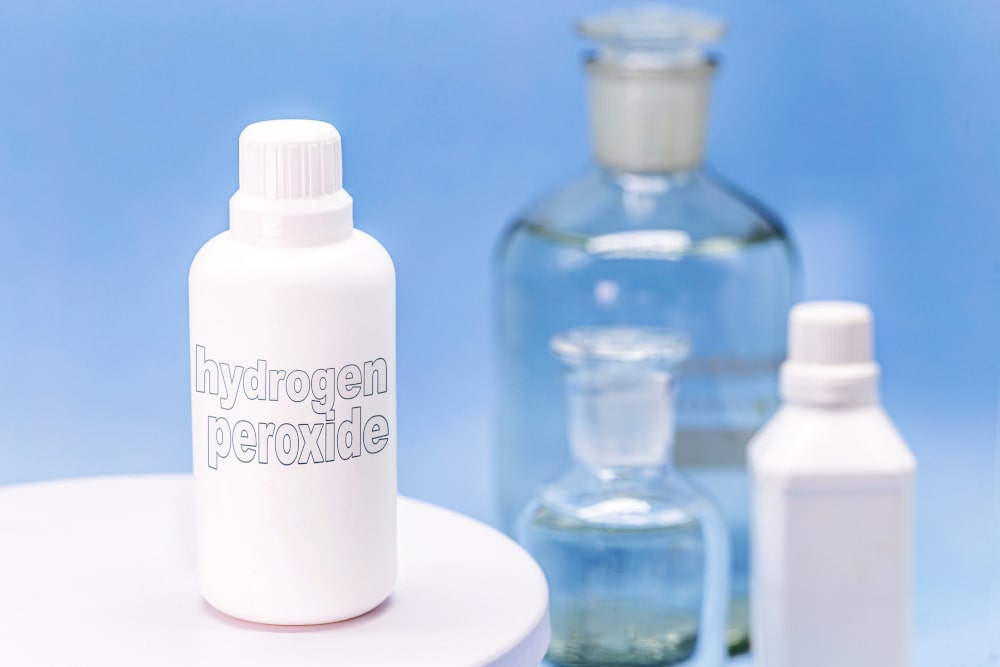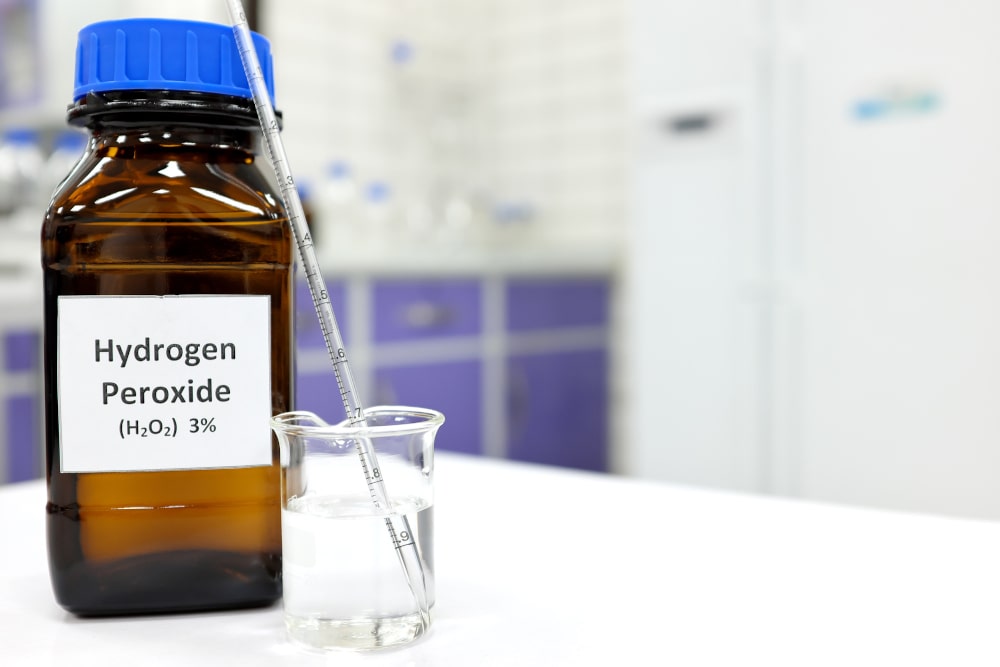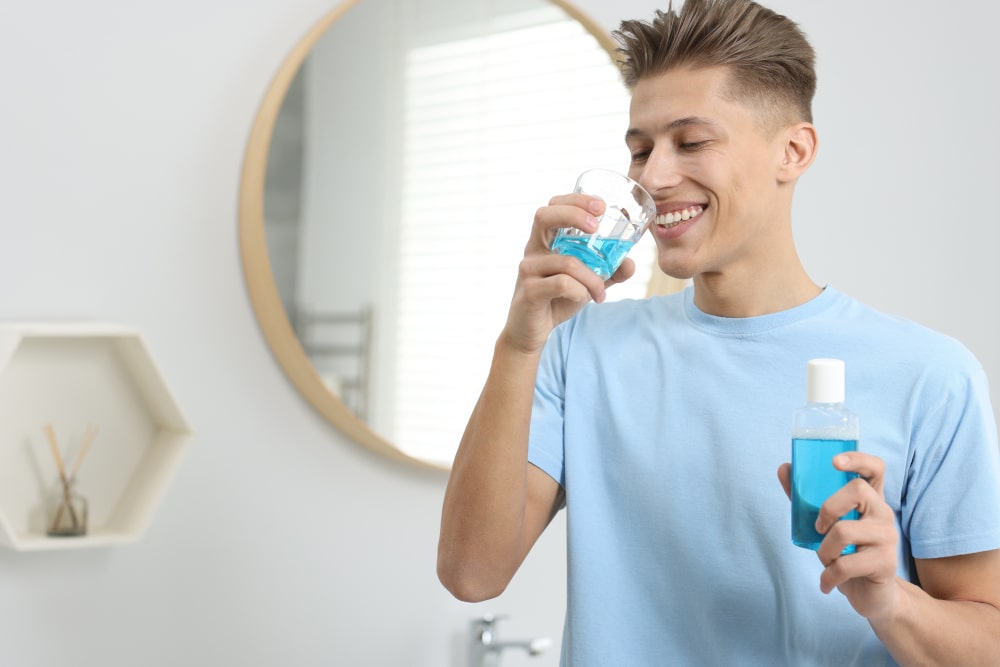
Hydrogen Peroxide Mouthwash: Benefits, Risks, and Safe Use Guide
Key Takeaways
- Hydrogen peroxide is a common disinfectant that can serve as a mild antiseptic mouthwash when appropriately diluted.
- It helps kill bacteria, reduce plaque, and promote gum healing, but misuse or overuse can irritate oral tissues.
- Only low concentrations (around 1.5% to 3%) are considered safe for mouth rinsing, and it should never be swallowed.
- Always consult your dentist before using hydrogen peroxide for oral care.
What exactly is hydrogen peroxide, and how does it work as a mouthwash?
It’s easy to think of hydrogen peroxide (H₂O₂) as just a household disinfectant — but in dentistry, it’s far more than that. Chemically, hydrogen peroxide is a compound composed of two hydrogen atoms and two oxygen atoms, giving it strong oxidizing properties. When it comes into contact with organic material (like bacteria in your mouth), it releases oxygen and water, breaking down bacterial cell walls and helping eliminate harmful microorganisms.
The science behind its antimicrobial action
When hydrogen peroxide is used as a mouth rinse, it triggers an oxidation reaction that kills anaerobic bacteria — those that thrive in oxygen-deprived environments such as gum pockets. According to the ADA, this process can reduce microbial load and may temporarily freshen breath by removing bacterial buildup.
Moreover, the mild bubbling you see when hydrogen peroxide contacts tissue isn’t just cosmetic — it’s evidence of oxygen being released, cleaning away debris and helping wounds in the mouth heal.
Dr. Rob Eisen, DDS, of Barrie Smile Centre, explains:
“Hydrogen peroxide, when used properly, can help reduce bacterial activity and inflammation. It’s not meant for everyday long-term use, but it can help manage gingivitis or minor oral irritation under professional guidance.”
Dentists often suggest hydrogen peroxide mouthwash as a short-term adjunct for:
- Reducing plaque and bacteria in cases of mild gum infection
- Promoting healing after dental procedures
- Managing oral ulcers or canker sores
The key, however, lies in concentration and frequency — using it too often or in too strong a solution can damage soft tissues or enamel.
Is hydrogen peroxide safe to use as a mouthwash?

Safety depends entirely on concentration and proper use. Over-the-counter hydrogen peroxide solutions are typically sold at 3% strength, which must be diluted before oral use. The recommended ratio is usually one part hydrogen peroxide to two parts water, resulting in about a 1.5% solution.
Official guidance and research
The U.S. Food and Drug Administration (FDA) classifies hydrogen peroxide as a safe antiseptic ingredient when used correctly. The American Dental Association (ADA) does not officially endorse hydrogen peroxide as a daily mouthwash but acknowledges its clinical use under dental supervision.
Dr. Amir Guorgui, BSC, DMD, MACSD, notes:
“Hydrogen peroxide can be beneficial in the right context. I always advise patients to use it only in diluted form and for limited periods — never as a substitute for regular oral hygiene or professional cleanings.”
When not to use hydrogen peroxide
Hydrogen peroxide mouthwash is not recommended if you:
- Have open wounds, ulcers, or severe gum disease without professional supervision
- Are you undergoing orthodontic treatment, or have sensitive oral tissues?
- Are you using it more than once daily or over several weeks continuously?
Long-term or excessive use can lead to tooth sensitivity, enamel damage, or soft-tissue irritation.
What are the benefits of using a hydrogen peroxide mouthwash?
Comparison: Hydrogen Peroxide vs. Regular Mouthwash
| Feature | Hydrogen Peroxide Mouthwash | Regular Mouthwash |
|---|---|---|
| Main Purpose | Antimicrobial & mild whitening | Antibacterial & breath freshening |
| Active Ingredient | Hydrogen peroxide (1.5%–3%) | Alcohol, chlorhexidine, or essential oils |
| Whitening Effect | Mild surface stain removal | Usually none |
| Ideal Use | Short-term treatment under dental advice | Daily use for hygiene maintenance |
| Potential Risks | Irritation if overused | Dry mouth (if alcohol-based) |
Hydrogen peroxide can complement your dental hygiene routine if used correctly — but professional guidance is essential. If you’re unsure whether it’s right for you, speak with your dentist at Barrie Smile Centre for personalized recommendations.
What are the potential side effects of hydrogen peroxide mouthwash?
Even though hydrogen peroxide has recognized antimicrobial benefits, improper use or overuse can lead to unwanted side effects. It’s essential to understand these potential risks before incorporating them into your oral care routine.
Common side effects
- Oral irritation: Frequent or high-concentration use can irritate soft tissues, such as the cheeks, tongue, and gums. The oxidation process that kills bacteria can also harm healthy cells if exposure is prolonged.
- Tooth sensitivity: Repeated exposure to hydrogen peroxide can cause enamel erosion, leading to increased sensitivity to hot, cold, or sweet foods.
- Mucosal burns: Concentrations above 3% can cause chemical burns or white patches (leukoplakia-like reactions) on the oral mucosa.
- Altered taste: A temporary metallic or bitter taste is familiar and typically subsides after rinsing with water.
Safe usage tips
- Always dilute 3% hydrogen peroxide before use. Mix one part hydrogen peroxide with two parts water to achieve a safe 1.5% solution.
- Limit frequency to once per day or less, and only for a few days unless directed by your dentist.
- Avoid swallowing the solution — hydrogen peroxide can irritate the stomach lining if ingested.
- Rinse thoroughly with plain water after use to remove any residual peroxide.
Side Effects and Safety Table
| Risk Type | Description | Prevention Tip |
|---|---|---|
| Irritation | Burning or tingling in the gums or cheeks | Use a 1.5% diluted solution only |
| Sensitivity | Enamel softening, tooth pain | Limit use to short-term only |
| Mucosal Burns | White lesions from high concentration | Never use above 3% strength |
| Stomach Upset | From accidental swallowing | Spit out completely, don’t ingest |
How should you dilute hydrogen peroxide for safe mouth rinsing?

Proper dilution is crucial to ensure that hydrogen peroxide is both practical and gentle on oral tissues. Most commercially available hydrogen peroxide solutions contain a 3% concentration, which must be diluted before rinsing.
Step-by-step guide for dilution
- Start with 3% hydrogen peroxide. This is the standard household concentration.
- Mix with water in a 1:2 ratio — one part hydrogen peroxide and two parts water.
- Example: 1 tablespoon (15 mL) of 3% hydrogen peroxide + 2 tablespoons (30 mL) of water = approximately 1.5% solution.
- Rinse for no longer than 30 seconds, then spit it out. Do not swallow.
- Use once daily or every other day, as advised by your dentist.
- Store safely in a cool, dark place away from sunlight, as hydrogen peroxide decomposes when exposed to light.
Hydrogen Peroxide Dilution Guide
| Starting Concentration | Dilution Ratio | Final Strength | Safe for Oral Use? |
|---|---|---|---|
| 3% (household) | 1:2 (H₂O₂:water) | 1.5% | ✔ Recommended |
| 6% (some salon products) | 1:3 | 1.5% | ✔ With caution, not ideal |
| 12% or higher | Do not use | N/A | ✖ Unsafe for oral care |
Always consult your dentist before beginning any hydrogen peroxide rinse routine. The Barrie Smile Centre team advises that this rinse should complement, not replace, brushing, flossing, and professional cleanings.
Is food-grade hydrogen peroxide different from regular peroxide?
The term “food grade hydrogen peroxide” often confuses. While both food-grade and regular (pharmaceutical grade) hydrogen peroxide share the same base chemical structure, they differ significantly in purity and intended use.
Understanding the difference
- Food-grade hydrogen peroxide contains no stabilizers or additives and is typically sold in 35% concentration, intended for industrial or food processing use (like disinfecting packaging).
- Pharmaceutical-grade hydrogen peroxide is the 3% solution commonly found in drugstores and approved for topical antiseptic use, including mouth rinses, when diluted.
Safety considerations
Food-grade hydrogen peroxide is far too concentrated for oral use without extensive dilution. Even a few drops of 35% solution can cause severe burns or internal injury if ingested. The FDA strongly warns against using undiluted food-grade peroxide for any internal or oral purpose.
Food Grade vs. Regular Hydrogen Peroxide
| Type | Concentration | Additives | Intended Use | Safe for Mouth Rinsing? |
|---|---|---|---|---|
| Food Grade | 35% | None | Industrial & food processing | Unsafe, highly corrosive |
| Pharmaceutical Grade | 3% | Stabilizers | Medical & dental applications | Safe when diluted to 1.5% |
Use only pharmaceutical-grade 3% hydrogen peroxide, diluted as directed, for oral care. Food-grade hydrogen peroxide should never come into contact with your mouth or skin unless it is handled under strictly controlled laboratory conditions.
Can hydrogen peroxide help with gum disease treatment?
Hydrogen peroxide has been extensively studied for its ability to combat bacteria that contribute to the development of gingivitis and periodontitis. Its oxygen-releasing action can help disrupt anaerobic bacteria responsible for gum infections. However, while it offers temporary relief, it should not replace professional periodontal care.
Scientific evidence
A study published in the Journal of Clinical Periodontology found that patients who used a 1.5% hydrogen peroxide rinse twice daily showed a significant reduction in gingival bleeding and bacterial plaque compared to those who used a saline rinse. Another study in the Journal of the International Society of Preventive & Community Dentistry confirmed that hydrogen peroxide can reduce inflammation in mild gingivitis cases when used under dental supervision.
How it works in gum disease management
Hydrogen peroxide’s oxidative properties break down the bacterial biofilm that forms along the gumline. By releasing oxygen, it reduces the anaerobic bacterial population that thrives in gum pockets, thereby lowering the risk of infection.
Can you rinse your mouth with peroxide every day?

While hydrogen peroxide offers notable antimicrobial benefits, its long-term use is not recommended for daily purposes. The oral tissues are delicate, and prolonged exposure — even to diluted solutions — can cause cumulative irritation.
Safe frequency and duration
- Use hydrogen peroxide rinses no more than once daily and for up to 7 consecutive days unless otherwise directed by a dental professional.
- For ongoing maintenance, switch to alcohol-free antimicrobial rinses that are designed for daily use.
- Always dilute to a 1.5% concentration before rinsing.
Risks of overuse
Long-term daily use can lead to:
- Tissue irritation and white patches on gums or inner cheeks
- Increased tooth sensitivity due to enamel softening
- Altered taste or burning sensation in the mouth
In an online discussion on the Canadian Dental Hygienists Association Forum (2023), professionals emphasized that hydrogen peroxide should be viewed as a temporary adjunct, not a routine rinse.
Natural alternatives for daily use
- Saltwater rinse: Gentle antiseptic properties for everyday use.
- Aloe vera mouth rinse: Shown to reduce gingival inflammation without irritation.
- Green tea extract rinses: Antioxidant-rich and helps reduce bacterial growth.
What are the best alternatives to hydrogen peroxide mouthwash?
If you’re looking for safer or more sustainable long-term oral rinses, several alternatives are supported by research. The right choice depends on your oral health goals — whether it’s reducing plaque, preventing gum disease, or maintaining fresh breath.
Common alternatives and their benefits
| Type | Key Ingredient | Benefits | Drawbacks |
|---|---|---|---|
| Chlorhexidine Mouthwash | Chlorhexidine gluconate (0.12–0.2%) | Highly effective against bacteria and plaque | It can cause tooth staining with prolonged use |
| Fluoride Mouthwash | Sodium fluoride | Strengthens enamel, helps prevent decay | Less impact on bacteria or inflammation |
| Baking Soda Rinse | Sodium bicarbonate | Neutralizes acids, gentle on gums | Mild taste, limited antibacterial action |
| Aloe Vera Rinse | Aloe vera extract | Soothes inflamed gums, promotes healing | Shorter shelf life |
| Saltwater Rinse | Sodium chloride in warm water | Natural, inexpensive, safe for daily use | Limited antimicrobial strength |
How do dentists at Barrie Smile Centre recommend using hydrogen peroxide safely?
At Barrie Smile Centre, patient safety is always our top priority. The clinic’s dental professionals, led by Dr. Rob Eisen, DDS and Dr. Amir Guorgui, DMD, emphasize that hydrogen peroxide can be helpful for short-term oral care — but only when used correctly and under guidance.
Professional opinion and best practices
Hydrogen peroxide is not a “one-size-fits-all” solution. The team at Barrie Smile Centre advises that patients should first undergo a comprehensive dental evaluation before adding any peroxide-based rinse to their oral hygiene routine. This ensures that existing conditions such as gum sensitivity, dental restorations, or mucosal irritation are taken into account.
Step-by-step guide to safe use
- Start with 3% pharmaceutical-grade hydrogen peroxide. Avoid higher concentrations such as 6% or 35% food-grade solutions.
- Dilute one part peroxide with two parts water to reach a safe 1.5% solution.
- Rinse gently for 30 seconds, swishing the solution around your mouth.
- Spit it out completely — never swallow the mixture.
- Follow up with a water rinse to remove any residual peroxide.
- Use once daily for up to 7 days, then discontinue or consult your dentist before resuming.
Should you use hydrogen peroxide as a mouthwash?
Hydrogen peroxide can be a valuable short-term adjunct to oral hygiene — but it’s not a substitute for professional dental care. When used responsibly, it can help reduce bacteria, alleviate mild gum inflammation, and gently brighten teeth. However, improper use can lead to tissue irritation, enamel damage, or sensitivity.
Pros and cons summary
| Aspect | Pros | Cons |
|---|---|---|
| Antimicrobial Action | Reduces harmful bacteria and plaque | Overuse may irritate soft tissues |
| Whitening Effect | Mild stain removal | It can cause enamel sensitivity with prolonged use |
| Healing Support | Helps cleanse oral wounds | Not suitable for open sores or chronic use |
| Accessibility | Inexpensive and widely available | Requires careful dilution and short-term use only |
Used wisely, hydrogen peroxide can complement your oral health routine — especially for temporary relief of minor gum irritation or surface stains. For sustained dental health, routine checkups, professional cleanings, and dentist-approved rinses remain the safest and most effective options for maintaining oral health.
For more professional dental insights or to schedule a visit, explore Barrie Smile Centre’s website.
References:
- Canadian Dental Association: www.cda-adc.ca
- Journal of Clinical Periodontology (2021): onlinelibrary.wiley.com
- American Dental Association: www.ada.org
- FDA Oral Health Product Guidelines: www.fda.gov
Frequently Asked Questions about Hydrogen Peroxide Mouthwash
Is it safe to use hydrogen peroxide as a mouthwash every day?
It’s generally safe to use a diluted hydrogen peroxide mouthwash (no stronger than 1.5%) a few times a week. However, using it daily for an extended period may irritate your gums or oral tissues. Our dentists at Barrie Smile Centre recommend alternating it with a gentler rinse or using it under the supervision of a professional.
How should I dilute hydrogen peroxide for mouth rinsing?
Use a 3% hydrogen peroxide solution and mix equal parts with water (1:1) to make it about 1.5%. Swish for 30 seconds, then spit it out — do not swallow. This dilution helps minimize irritation while maintaining antibacterial benefits.
Can hydrogen peroxide whiten teeth?
Yes — hydrogen peroxide is the active ingredient in many professional and over-the-counter whitening products. However, rinsing alone has only mild whitening effects. For noticeable and even results, it’s best to consult your dentist for professional whitening treatments.
What are the side effects of hydrogen peroxide mouthwash?
Mild side effects can include temporary tooth sensitivity, gum irritation, or a burning sensation. These usually resolve quickly. If you notice white patches, soreness, or prolonged discomfort, discontinue use and consult your dentist.
Who should avoid hydrogen peroxide mouthwash?
Children, people with oral ulcers, and patients with sensitive gums or recent dental work should avoid hydrogen peroxide rinses unless prescribed by a dentist. Pregnant or breastfeeding patients should also consult their dental professional before use.
What’s the best alternative to hydrogen peroxide mouthwash?
If you’re looking for a gentler option, alcohol-free mouthwashes containing fluoride or chlorhexidine (for gum health) are excellent alternatives. Your Barrie Smile Centre dentist can recommend the best product based on your oral health goals.

See what our patients are saying:
The Barrie Smile Centre is the best dental office I've ever been to. The staff is very friendly,professional and knowledgeable. They take away any anxiety and fear of going for a procedure. I highly recommend them!
Very clean, professional and friendly! They have done lots of work for me including 2 implants. I highly recommend them!
Very clean, professional and helpful. 2 other dentists previously tried to fix my composite veneer and both times it look awful and/or was the wrong colour. One trip here and everything was fixed!
Very friendly, helpful staff. Makes you feel welcome as soon as you enter. I needed a tooth removed and got in the same day I called. When I arrived I didn’t have to wait. I have numerous problem with my teeth and they came up with a solution. Thank you all so much.
Just got home from the Smile Centre and I'm thrilled with my results. Had Zoom whitening, and it was better than I expected. The attendant took the time to explain everything super thoroughly. She warned I may have sensitivity but so far so good. I wish I did it ages ago.
The first thing I noticed upon entering the building was the beautiful design plan and lovely staff. I was greeted at the door and made comfortable throughout my entire experience. Everything was explained to me in detail and the staff always made sure I fully understood. This is an amazing office and I would 10/10 recommend it!!
Amazing fast clean attentive friendly ! Im sold! Thankkk youuuuu guys !!!!!!! Had a wisdom.tooth taken out under sedation! All.went perfect and you guys were awesomee!
Every time I go to the Smile Centre in Barrie it’s an amazing experience! Everyone from the admin staff to the dentists are so helpful. Not only do they tell you your options (in my case options for a missing tooth), but they also explain the pros and cons of every option. I highly recommend the Smile Centre
Barrie Smile Centre is truly amazing I called and had an issue with with some tooth pain they were able to fit me in same day which I was truly grateful for. All the staff are kind and professional they truly care about there patients. Big thank you to Dr.Eisen for being so kind and helping me in this situation. I highly recommend Barrie Smile Centre 😃 Thanks again
Great family dentist, has always been on time for appointments. Doing a great job during these times with cleanliness as well! Very professional staff!

